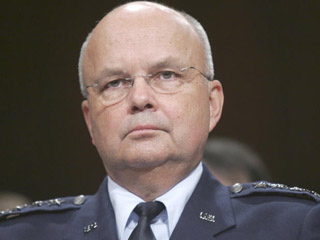|
|
|
Hayden: Chain of
Interrogations Yielded Bulk of Intelligence Knowledge
The former head of the CIA told FOX News last year that five years
after the Sept. 11, 2001, terror attacks, 60 percent of the knowledge of
the U.S. intelligence community about Al Qaeda came from enhanced
interrogation techniques.

Former CIA Director Michael
Hayden, shown here, says enhanced interrogation techniques yielded
critical, actionable intelligence (AP Photo).
FOXNews.Wednesday, April 22, 2009. Five years after the Sept. 11, 2001,
terror attacks, 60 percent of the knowledge of the U.S. intelligence
community about Al Qaeda, its leadership structure and its operations
came from enhanced interrogation techniques.
That's what former CIA Director Michael Hayden told FOX News late last
year.
Other U.S. officials told FOX News on Tuesday that they stand by a May
2005 memo that said that enhanced techniques used in interrogations
"have led to specific, actionable intelligence as well as a general
increase in the amount of intelligence regarding Al Qaeda and its
affiliates."
On Tuesday, President Obama's national intelligence director argued in a
memo to staff -- and a public statement -- that it's impossible to know
whether CIA interrogators would have gleaned the same information using
techniques that are not deemed controversial.
DNI Dennis Blair added that waterboarding and other approved methods
that have now been abandoned damaged the United States' image abroad.
"The information gained from these techniques was valuable in some
instances, but there is no way of knowing whether the same information
could have been obtained through other means. The bottom line is these
techniques have hurt our image around the world, the damage they have
done to our interests far outweighed whatever benefit they gave us and
they are not essential to our national security," he said.
But U.S. officials familiar with the intelligence gained from the
interrogations pointed to examples of how the chain of information
expanded. They detailed how in the spring of 2002, Abu Zubaydah, Al
Qaeda's operations chief who ran the training camps in Afghanistan where
the Sept. 11 hijackers were trained, was picked up in Pakistan.
Zubaydah was nearly killed in the fire fight and was saved by U.S. Army
doctors.
He ended up providing leads to Ramzi bin al-Shibh, who was also captured
in Pakistan. Bin al-Shibh was part of the Hamburg, Germany, cell of Al
Qaeda where Sept. 11 hijacker Mohammed Atta was also stationed.
The information from Zubaydah and from bin al-Shibh led to the capture
in the spring of 2003 of Khalid Sheik Mohammed, the architect of the
Sept. 11 attacks, according to U.S. officials.
A close reading of the memo from May 2005 shows that U.S. officials
learned during the Mohammed interrogations about a "Second Wave" of
attacks aimed for Los Angeles.
It also led to the unraveling of a cell in Southeast Asia led by Riduan
bin Isomuddin, better known as Hambali, who was head of an Al
Qaeda-affiliated group that was identified with the Bali nightclub
bombing in 2002 that was responsible for the deaths of more than 100
people.
The capture of Hambali enabled confirmation of other information
provided by Mohammad, according to the officials.
Zubaydah also provided significant information on two operatives,
including Jose Padilla, who planned to detonate a dirty bomb in the
Washington, D.C., area, the officials noted.
Source: FOXNews.com
|
|